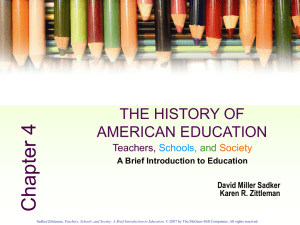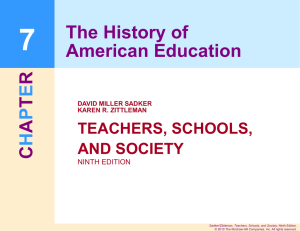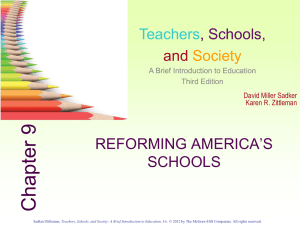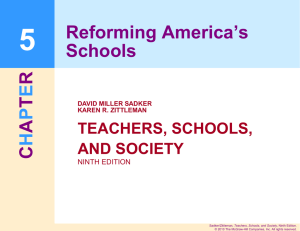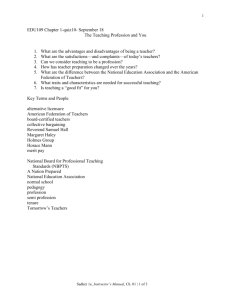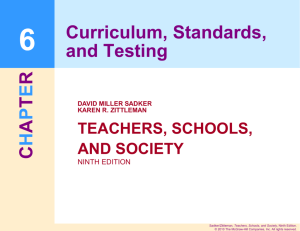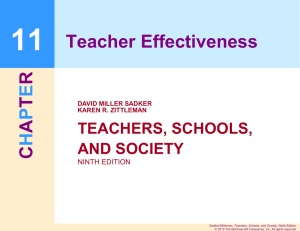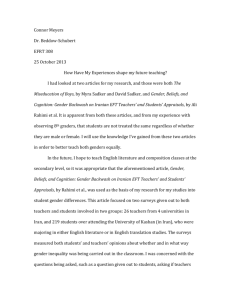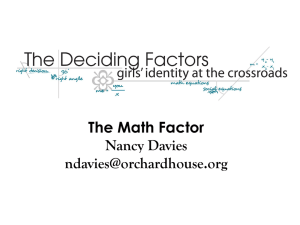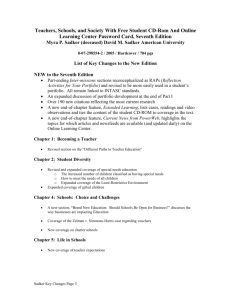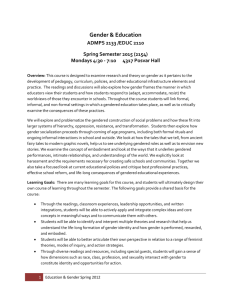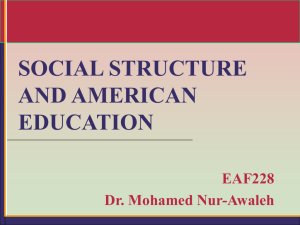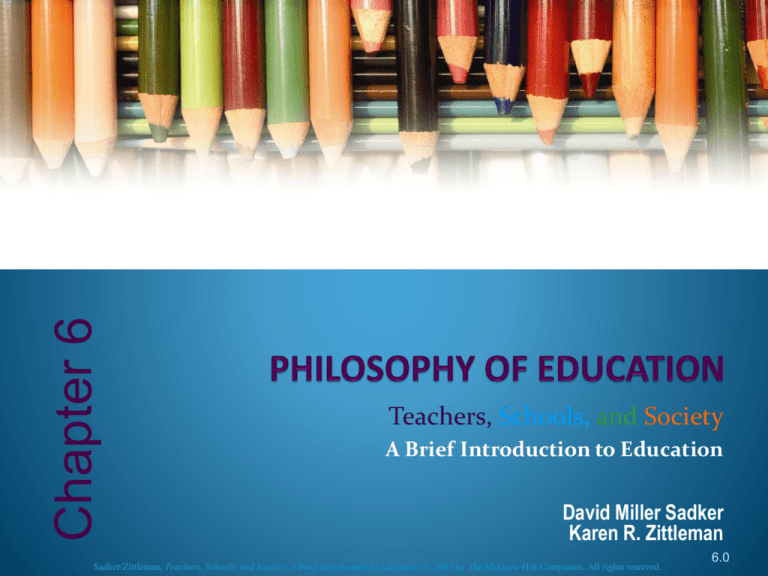
Chapter 6
Teachers, Schools, and Society
A Brief Introduction to Education
David Miller Sadker
Karen R. Zittleman
Sadker/Zittleman, Teachers, Schools, and Society: A Brief Introduction to Education. © 2007 by The McGraw-Hill Companies. All rights reserved.
6.0
Philosophy of Education
Philosophy - is the study of general and
fundamental problems concerning matters such as
existence, knowledge, values, reason, mind, and
language.
Philosophy of Education (elements) –
Epistemology: What is knowledge? How do we
know what we know? How did we acquire that
knowledge?
Only through Seeing, hearing,
touching, smelling? Prove it! = Empiricism
or through reasoning, logic and philosophy that
we maybe cannot sense? = Rationalism
Sadker/Zittleman, Teachers, Schools, and Society: A Brief Introduction to Education. © 2007 by The McGraw-Hill Companies. All rights reserved.
6.1
Philosophy of Education
Axiology: influence of values, beliefs and ethics
on learning. What do we value?
Now Add: Metaphysics:
What is real? Is reality only composed of matter
that we can sense? =Materialism – Aristotle
“common sense and the natural sciences”
But you cannot see God, so is he/she real? Maybe
the physical world is only an illusion!
=Spiritualism or Idealism
Sadker/Zittleman, Teachers, Schools, and Society: A Brief Introduction to Education. © 2007 by The McGraw-Hill Companies. All rights reserved.
6.2
Philosophy of Education
Or is the reality of the world comprised of both
materialism and idealism? -Dualism from Descartes
(“I think therefore I am”) called Cartesian Dualism
Dialectical Materialism – Marx scaffolds Hegel with
Thesis – Antithesis – Synthesis - is part of the basis
for Communism including the theory of Economic
Determinism/Class Struggle
Sadker/Zittleman, Teachers, Schools, and Society: A Brief Introduction to Education. © 2007 by The McGraw-Hill Companies. All rights reserved.
6.3
Five Major Philosophies of Education
First review your interpretations of your own
philosophy of education from page 186
PAUSE
Teacher-Centered Philosophies
Essentialism – Bagley, Hirsch
Perennialism – Hutchins, Adler
Sadker/Zittleman, Teachers, Schools, and Society: A Brief Introduction to Education. © 2007 by The McGraw-Hill Companies. All rights reserved.
6.4
ESSENTIALISM
EMPHASIS ON RIGOROUS ACADEMICS
PROMOTION BASED ON MASTERY OF MATERIAL
CURRICULUM DETERMINED BY ADMINISTRATORS
AND TEACHERS
Back to Basics! Common, “core” curriculum for all, “A
Nation at Risk,” teacher is intellectual and moral role
model. We must educate the “whole child.”
Sadker/Zittleman, Teachers, Schools, and Society: A Brief Introduction to Education. © 2007 by The McGraw-Hill Companies. All rights reserved.
6.5
PERENNIALISM
FOCUS ON CLASSICAL IDEAS, DEVELOP THE MIND, SOCRATIC
METHOD OF QUESTIONING/CHALLENGING
DEVELOP REASON AND MORAL QUALITIES
EMPHASIS ON HUMANITIES AND THE GREAT BOOKS OF
ARISTOTLE, DARWIN, DICKENS, MARX, PLATO, THE BIBLE,
CHAUCER, MELVILLE, PLATO
LITTLE FLEXIBILITY IN TEACHER DEVELOPED CURRICULUM
FOCUS ON CONCEPTS RATHER THAN FACTS
EMPHASIS ON LEARNING FOR LEARNING’S SAKE (brain = muscle)
Sadker/Zittleman, Teachers, Schools, and Society: A Brief Introduction to Education. © 2007 by The McGraw-Hill Companies. All rights reserved.
6.6
Five Major Philosophies of Education
Student-Centered Philosophies
Progressivism – Dewey
Social Reconstructivism - Counts (student of Dewey),
Paulo Reglus Neves Freire
Existentialism – A.S. Neil
Sadker/Zittleman, Teachers, Schools, and Society: A Brief Introduction to Education. © 2007 by The McGraw-Hill Companies. All rights reserved.
6.7
PROGRESSIVISM
EDUCATION BASED ON NEEDS AND INTERESTS OF STUDENTS
STUDENTS LEARN BY DOING AS WELL AS FROM TEXTBOOKS
TEACHING THROUGH FIELD TRIPS AND GAMES
EMPHASIS ON NATURAL AND SOCIAL SCIENCES
EXPERIENTIAL LEARNING
GROUPING BY INTEREST AND ABILITIES
Sadker/Zittleman, Teachers, Schools, and Society: A Brief Introduction to Education. © 2007 by The McGraw-Hill Companies. All rights reserved.
6.8
SOCIAL RECONSTRUCTIONISM
PHYSICAL WORLD AS THE BASIS OF REALITY
LEARN FROM MEANINGFUL SOCIAL EXPERIENCES
LEARN BY RECONSTRUCTING SOCIETY TO MEET EVOLVING
NEEDS AT TIMES IN *CONFLICT WITH THE STATUS QUO, ANTI
SOCIAL DARWINISM (class struggle), ADVOCATES OF THE POOR,
EQUALITY OF EDUCATION FOR RICH AND POOR IS A GOAL
BECOME INTELLIGENT PROBLEM SOLVERS, ENJOY LEARNING,
LIVE COMFORTABLY IN AND RESHAPE THE WORLD
Sadker/Zittleman, Teachers, Schools, and Society: A Brief Introduction to Education. © 2007 by The McGraw-Hill Companies. All rights reserved.
6.9
EXISTENTIALISM
Definition: The conditions of existence of the
individual person and their emotions, actions,
responsibilities, and thoughts.
All must be considered for the overall health of the
individual.
Soren Kierkegaard – father of Existentialism
Viktor Frankl – logo therapy (existential vacuum
leads to personal collapse) man must have
meaning in life to survive and thrive
Sadker/Zittleman, Teachers, Schools, and Society: A Brief Introduction to Education. © 2007 by The McGraw-Hill Companies. All rights reserved.
6.10
EXISTENTIALISM
EMPHASIS ON INDIVIDUALITY
STUDENTS DETERMINE WHAT IS TRUE, RIGHT, BEAUTIFUL
HELPING STUDENTS UNDERSTAND THEMSELVES
TEACHERS EXPOSE STUDENTS TO VARIOUS PATHS: STUDENTS
CHOOSE WHICH TO FOLLOW
HUMANITIES EMPHASIZED MATH AND SCIENCE DEEMPHASIZED
RARELY FOUND IN PUBLIC SCHOOLS, NO GRADING SYSTEM
A.S. Neil’s Summerhill
Sadker/Zittleman, Teachers, Schools, and Society: A Brief Introduction to Education. © 2007 by The McGraw-Hill Companies. All rights reserved.
6.11
Psychology’s Additional Influences on
American Education
Constructivism – knowledge must be constructed by each
person, you cannot effectively transfer knowledge. Piaget
and theory of cognitive development through interaction.
Genetic epistemology. Four stages of development.
Bloom’s Taxonomy of learning.
Behavioralism – free will is an illusion. Humans are shaped
entirely by their environment. B.F. Skinner and behavior
modification, moving students from extrinsic motivation
to intrinsic motivation through rewarding proper behavior.
(Rats and pellets). Alter the environment to promote
learning.
Sadker/Zittleman, Teachers, Schools, and Society: A Brief Introduction to Education. © 2007 by The McGraw-Hill Companies. All rights reserved.
6.12
CONSTRUCTIVISM
CENTERED ON THE LEARNER’S GROWTH
CONSTANT NEED TO MAKE SENSE OF NEW
INFORMATION
“SCAFFOLDING” LINKS NEW INFORMATION TO OLD
STUDENT AND TEACHER CONSTANTLY CHALLENGE
EXISTING ASSUMPTIONS
Sadker/Zittleman, Teachers, Schools, and Society: A Brief Introduction to Education. © 2007 by The McGraw-Hill Companies. All rights reserved.
6.13
Benjamin Bloom
Refer to Bloom’s Taxonomy Handout
Sadker/Zittleman, Teachers, Schools, and Society: A Brief Introduction to Education. © 2007 by The McGraw-Hill Companies. All rights reserved.
6.14
BEHAVIORISM
VIEWS FREE WILL AS AN ILLUSION
REALITY BASED ONLY ON SCIENTIFIC OBSERVATION
POSITIVE REWARDS ENCOURAGE DESIRED BEHAVIOR
CURRICULUM IS BASED ON INCREMENTAL LEARNING
CURRICULUM IS CONTROLLED BY SCHOOL PERSONNEL
Sadker/Zittleman, Teachers, Schools, and Society: A Brief Introduction to Education. © 2007 by The McGraw-Hill Companies. All rights reserved.
6.15
Other Influences on American Education
Ethnocentrism – Western influences are predominant
in America. Other cultures? (Extreme is xenophobia)
Informal Education – formal teaching and informal
teaching, showing “how to”
Verbal (non-reading) traditions – stories, survival,
values, “the way”
Sadker/Zittleman, Teachers, Schools, and Society: A Brief Introduction to Education. © 2007 by The McGraw-Hill Companies. All rights reserved.
6.16
Forming your own Philosophy of
Education as a Teacher
What do you believe is/are the purpose(s) of American
Education?
What content/skills should be taught at your school?
Should students or teachers direct learning?
How should schools teach this content and skills?
How should learning be measured?
Should everyone have access to education?
Can everyone actually learn?
What can you do to create the proper learning environment
in your classroom – in your school to maximize learning?
Sadker/Zittleman, Teachers, Schools, and Society: A Brief Introduction to Education. © 2007 by The McGraw-Hill Companies. All rights reserved.
6.17
End
EDUC 110
Dr. Jackson
Sadker/Zittleman, Teachers, Schools, and Society: A Brief Introduction to Education. © 2007 by The McGraw-Hill Companies. All rights reserved.
6.18

